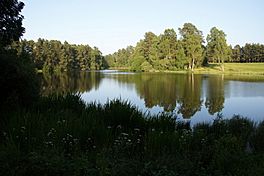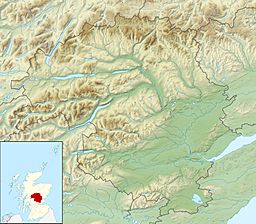Black Loch (Perth and Kinross) facts for kids
Quick facts for kids Black Loch |
|
|---|---|

Black Loch, Carsie, near Blairgowrie
|
|
| Coordinates | 56°34′09″N 3°20′36″W / 56.569100°N 3.343300°W |
| Type | freshwater loch |
| Max. length | 0.402 km (0.250 mi) |
| Max. width | 0.1609 km (0.1000 mi) |
| Surface area | 2.6 ha (6.4 acres) |
| Average depth | 4.75 ft (1.45 m) |
| Max. depth | 7 ft (2.1 m) |
| Water volume | 1,611,000 cu ft (45,600 m3) |
| Shore length1 | 0.8 km (0.50 mi) |
| Surface elevation | 51 m (167 ft) |
| Max. temperature | 60.1 °F (15.6 °C) |
| Min. temperature | 57.4 °F (14.1 °C) |
| Islands | 0 |
| 1 Shore length is not a well-defined measure. | |
Black Loch is a small, calm freshwater loch (which is the Scottish word for a lake). It is found in a flat area, about 1 mile south of Blairgowrie in Perth and Kinross, Scotland. The loch sits in the valley of the Lunan Burn, a small stream.
This special loch is important for nature. It is a designated Site of Special Scientific Interest (SSSI). This means it is a protected area because of its unique plants, animals, or geology. Black Loch is also part of a Special Area of Conservation, which gives it even more protection for its natural habitats.
Location and Surroundings
Black Loch is part of a group of small lakes in the area. It lies just east of another loch called White Loch. A bit further east, you will find Fingask Loch. All these lochs are quite close to each other, within half a mile.
An interesting fact about Black Loch is that part of it, along with the eastern end of White Loch, is located within the grounds of the Blairgowrie Golf Club. This shows how nature and human activities can exist side-by-side.
Why Black Loch is Special
Black Loch is protected because it is a great place for wildlife. The calm freshwater environment supports many different species. These protected areas help to keep the natural balance of the ecosystem.
Protecting places like Black Loch ensures that rare plants and animals have a safe home. It also allows scientists to study these natural environments. This helps us learn more about our planet.


